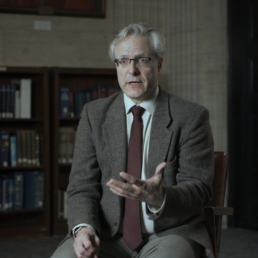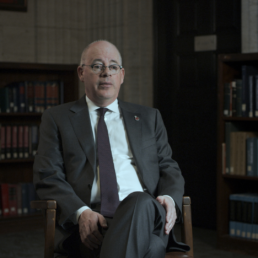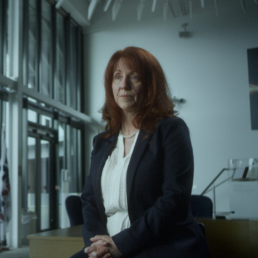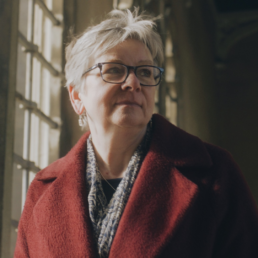Science Diplomacy Series: UK, Canada and Emerging Technology
Science Diplomacy Video Series
UK, Canada & Emerging Technology
Our #ScienceDiplomacy video series explores how scientific researchers and academics from the UK and Canada are collaborating to address some of the world’s biggest challenges.
Emerging technologies in various scientific and technical disciplines are being developed at incredible speed around the world. These technologies have the potential to solve some of the world’s biggest challenges. In the UK, advanced computing capabilities are becoming essential to biology, chemistry, physics, and nearly every other area of research by helping to model the effects of climate change, power the discovery of new drugs and model future pandemics.
When it comes to the advancement of emerging technologies, science diplomacy plays a vital role. International collaboration between countries like the UK and Canada continues to enhance scientific knowledge and capabilities worldwide. It also helps to ensure that technology is being used as a force for digital good, brings together leading experts to turbocharge development, and considers the policy challenges such technology can bring like privacy and protecting research from others who may wish to obtain them.
In the final video of our #ScienceDiplomacy series you will hear from:
- Dr. Joel Martin: National Research Council of Canada’s Chief Digital Research Officer and Chief Science Officer
- Iain Stewart: President of the National Research Council of Canada
- Professor Carole Mundell: President of the Science Council & Professor of Extragalactic Astronomy at the University of Bath
The three experts discuss the importance of UK and Canada collaboration in areas like artificial intelligence and quantum computing.
DID YOU KNOW?
→ The UK-Canada have the first industry led partnership between any two countries to develop quantum technologies, with research expected to impact significantly on healthcare, secure communications, defence, computing and financial services.
→ In 2017, the UK and Canada pledged to work together to develop emerging technologies, signing an ambitious science and innovation agreement covering multiple sectors valid for a period of ten years.

Dr. Joel Martin
Dr. Joel Martin is the NRC’s Chief Digital Research Officer and Chief Science Officer. He holds a Ph.D. in Computer Science, Machine Learning, from the Georgia Institute of Technology and completed post‑doctoral studies at the University of Pittsburgh. Dr. Martin has received awards for exceptional leadership and for innovative approaches to technology transfer. He has published dozens of peer-reviewed research articles and taught Computer Science courses at both the University of Ottawa and Carleton University.

Iain Stewart
In August 2016, Iain Stewart was appointed the 12th President of the National Research Council of Canada. His current term extends to September 2025. Prior to joining the NRC, Mr. Stewart was Associate Secretary of the Treasury Board Secretariat, and Assistant Deputy Minister, Policy, at the Department of Innovation, Science and Economic Development (ISED). At ISED, the Atlantic Canada Opportunities Agency, and as Assistant Vice‑President of Research at Dalhousie University, Mr. Stewart has held a range of executive positions focused on supporting business innovation and university research.

Professor Carole Mundell
Professor Carole Mundell was the Chief International Science Envoy at the Foreign, Commonwealth & Development Office from January to October 2021. Previously Professor Mundell was Chief Scientific Adviser at the Foreign & Commonwealth Office. She is Professor of Extragalactic Astronomy at the University of Bath where she holds the Hiroko Sherwin Chair in Extragalactic Astronomy, and a Fellow of the Institute of Physics and President of the Science Council.
Science Diplomacy Series: UK, Canada and Global Health
Science Diplomacy Video Series
UK, Canada & Global Health
Our #ScienceDiplomacy video series explores how scientific researchers and academics from the UK and Canada are collaborating to address some of the world’s biggest challenges.
The COVID-19 pandemic presented new and growing challenges that underscored the importance of international collaboration.
Scientific experts from the UK and Canada have been engaging in science diplomacy to better understand and respond to COVID-19. Keeping each other informed about the evolving virus by sharing scientific data and updates.
In this video you will hear from:
- Professor Sharon Peacock: Microbiologist and Professor of Public Health and Microbiology the University of Cambridge
- Dr. Mona Nemer: Canada’s Chief Science Advisor
- Professor Carole Mundell: President of the Science Council & Professor of Extragalactic Astronomy at the University of Bath
The three experts share why scientific collaboration between our two countries and the international community is crucial in responding to global health threats like the pandemic.
DID YOU KNOW?
→ UK-Canada joint work on AI analysis of genomics datasets prior to the pandemic ensured we were able to rapidly step-up expert level collaboration on variants of concern when COVID struck.
→ Partnerships such as the Canadian COVID Genomics Network and the COVID-19 Genomics UK Consortium have been crucial in inform understanding of the virus.
→ Researchers from Simon Fraser University and LSE worked together with other countries to study the impact of COVID-19 on women’s health, social and economic welfare.

Sharon Peacock, CBE FMedSci MRCP
Sharon Jayne Peacock CBE FMedSci MRCP is a British microbiologist who is Professor of Public Health and Microbiology in the Department of Medicine at the University of Cambridge. She is known for her work on the use of microbial whole genome sequencing in diagnostic and public health microbiology, particularly on the bacterium Burkholderia pseudomallei and on methicillin-resistant Staphylococcus aureus (MRSA).

Dr. Mona Nemer, C.M., C.Q., FRSC
Before becoming the Chief Science Advisor, Dr. Nemer was Professor and Vice-President of Research at the University of Ottawa and Director of the school’s Molecular Genetics and Cardiac Regeneration Laboratory. She holds a PhD in Chemistry from McGill University and did post-doctoral training in molecular biology at the Institut de Recherche Clinique de Montréal and Columbia University.

Professor Carole Mundell
Professor Carole Mundell was the Chief International Science Envoy at the Foreign, Commonwealth & Development Office from January to October 2021. Previously Professor Mundell was Chief Scientific Adviser at the Foreign & Commonwealth Office. She is Professor of Extragalactic Astronomy at the University of Bath where she holds the Hiroko Sherwin Chair in Extragalactic Astronomy, and a Fellow of the Institute of Physics and President of the Science Council.
